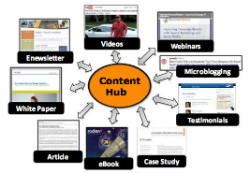
The web is flush with change and innovation. Gone are the days of linear information flow and incremental growth. Content flows in every direction through a variety of platforms, formats and devices. The mass adoption of the social and mobile web have facilitated a revolution of information access, sharing and publishing at a scale never before experienced.
Access to information for discovery has traditionally been most associated with search. According to comScore, Google handles over 11 billion queries a month. But did you know, Twitter delivers over 350 billion tweets each day? Facebook is now over 800 million users and Google Plus has had a flood of new users as well, with estimates now approaching over 50 million. Social media is ripe for discovery as well as engagement.
In an effort to distinguish themselves, many pundits in the search marketing and social media industries have treated each channel independently. Of course that’s not the reality of user experience and information discovery. Consumers and buyers move back and forth between social recommendations, search engines and social search on their journey to discover, consume and share information as well as to purchase.
Understanding the interplay between search, social media and content translates into opportunity for brands and marketers to engage an active internet marketing strategy that celebrates diversity of channels vs. silos – provided such efforts are customer focused.
The future of internet marketing brings the best of these disciplines together. To meet consumer needs, whether it’s B2B or B2C, it’s inevitable that PR will know SEO and Social Media Marketers with be versed in media relations.
Relevance, timeliness and sharability is the win with modern internet marketing. That means better content and better visibility in all the places customers might be looking or influenced by. It also means a better experience in brand / consumer interactions.
For example, searchers expect not only to find what they’re looking for on a search engine, but to interact with the results through commenting, rating, joining as well as buying. Purchase is just the start of social engagement with customers that extends across a lifecycle from prospect to evangelist. Adaptive internet marketing pays attention to those customer needs and creates a dynamic cycle of social and search interaction.
To that end, here are three areas in particular that I think internet marketers should pay attention to in the coming year:

Content Marketing: Creation & Curation – Many brands have begun adopting a publisher model of marketing through content as evidenced by the growth of “content marketing” and “content curation”. This will only continue and get increasingly competitive for those that can afford to scale original content and media. The sheer volume of content out there now is overwhelming (we now record and transfer 23 exabytes of data every 7 days). Social publishing platforms online and though mobile/tablet devices makes it incredibly easy to create and share.
However, original content creation is expensive to scale and challenging in the long term. Content curation will continue to grow as an efficient model for marketers to engage consumers as a source of signal amongst the noise.

Mobile and Tablet Explosion – It’s almost cliche to include Mobile in a prediction post because it’s been the “hot pick” for so many years. The days of reckoning for mobile are finally here. As of late 2010, more Americans own mobile devices than computers and Google’s timeline for growth of mobile match that of Google’s own search engine’s hockey stick growth. The mobile web (including tablet devices) is becoming as viable a marketplace as the Internet we’ve known over the past 10 years. Search, social, local and apps all offer opportunities for customer acquisition and engagement on mobile devices. Social networking is one of the top 3 uses of mobile phones and as apps and tablets proliferate the market, more time will be spent there and away from personal computers. Marketers must fish where the fish are.

Social Business – When you add up the impact of the social web on overall business outcomes, it’s easy to see why companies like IBM and many others are adopting social business models. Beyond Marketing, social communications, technologies and engagement manifest and facilitate in every aspect of a business’s operations from Customer Service to Legal to HR. Companies that incorporate social media literacy and empowerment from within will empower their employees, partners and customers to act collectively on behalf of the brand.
With each of these areas of focus lies an important consideration for how brands will connect people with content and experiences that create awareness, confidence, relationships, sharing and conversions. I’m a firm believer that search and social are inseparable as means of discovery that lead to valued business outcomes like sales. Pay attention to content, mobile and social business as you make internet marketing and business development plans for 2012 and beyond. Where do they fit within your go forward marketing strategy? Or are you already there?


